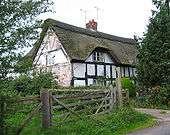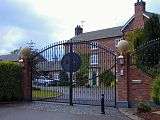Listed buildings in Hunsterson
Hunsterson is a civil parish in Cheshire East, England. It contains seven buildings that are recorded in the National Heritage List for England as designated listed buildings, all of which are at Grade II. This grade is the lowest of the three gradings given to listed buildings and is applied to "buildings of national importance and special interest".[1] The parish is almost entirely rural. The listed buildings consist of houses, farmhouses, cottages, a stable with paddock walls, and a church.
| Name and location | Photograph | Date | Notes |
|---|---|---|---|
| Brownmoss Farmhouse 53°00′21″N 2°26′52″W / 53.00578°N 2.44775°W |
— |
16th or 17th century | The farmhouse has had repeated extensions, giving it a T-shaped plan. It is partly timber-framed with brick infill, and partly in brick, and it has a thatched roof covered in corrugated metal. The farmhouse is in two storeys, and has an entrance front with a gabled wing on the left. The windows are casements. Inside is a blocked inglenook fireplace.[2] |
| Yewtree Cottage 53°00′41″N 2°27′07″W / 53.01139°N 2.45204°W |
 |
16th or 17th century | Front wall of the cottage is timber-framed with rendered infill, the rest in brick painted to resemble timber framing. The roof is thatched. The cottage has an L-shaped plan, and is in two storeys. The windows are casements, those in the upper floor being in dormers. Inside the cottage is an inglenook with a bressumer.[3] |
| Greenfields 53°00′25″N 2°26′25″W / 53.00689°N 2.44031°W |
— |
Early to mid 17th century | A farmhouse in brick with a tiled roof, it is in two storeys with an attic. It has a three-bay entrance front with a central gabled porch flanked by canted bay windows. There is a lower two-storey wing to the left. The windows are casements.[4] |
| Foxes Barn Cottage 53°00′44″N 2°27′44″W / 53.01235°N 2.46228°W |
— |
17th century | The cottage was extended later. The original part is timber-framed with brick infill on a plinth, the later part is in brick painted to resemble timber framing. The roofs are tiled. The cottage is in a single storey with an attic. The windows are casements, those in the upper floor being in gabled dormers and half-dormers.[5] |
| Stable and walls of paddocks 53°00′43″N 2°26′38″W / 53.01188°N 2.44401°W |
— |
Late 18th century | These were originally the paddocks to Doddington Hall. They consist of a stable block at the meeting point of four paddocks, and the wall surrounding the paddocks. The stable block has an entrance to all four paddocks. The paddock walls are 10–12 feet in height. The stable block also has a pitch hole and a loft door, and a hipped roof.[6] |
| Pewit Hall 52°59′44″N 2°26′28″W / 52.99547°N 2.44105°W |
 |
Early 19th century | A brick farmhouse with a slate roof. It is in three storeys, and has a symmetrical three-bay entrance front. The windows are casements. There is also a long wing stretching from the rear.[7] |
| St John's Church 53°00′47″N 2°26′39″W / 53.01311°N 2.44430°W |
 |
1837 | The church was designed by Edward Lapidge and paid for by the Delves Broughton family of Doddington Hall. It is constructed in sandstone with a slate roof, and consists of a nave and chancel in one cell, and a northwest vestry. At the west end is a gabled porch, a triple lancet window, a bellcote, and angle buttresses that rise to pinnacles with spires.[8][9] |
References
Citations
Sources
- Hartwell, Clare; Hyde, Matthew; Hubbard, Edward; Pevsner, Nikolaus (2011) [1971], Cheshire, The Buildings of England, New Haven and London: Yale University Press, ISBN 978-0-300-17043-6
- Historic England, "Brownmoss Farmhouse, Hunsterson (1137080)", National Heritage List for England, retrieved 29 January 2014
- Historic England, "Yewtree Cottage, Hunsterson (1137071)", National Heritage List for England, retrieved 29 January 2014
- Historic England, "Greenfields, Hunsterson (1138511)", National Heritage List for England, retrieved 29 January 2014
- Historic England, "Foxes Barn Cottage, Hunsterson (1137056)", National Heritage List for England, retrieved 29 January 2014
- Historic England, "Wall of paddocks and stable building, Hunsterson (1138512)", National Heritage List for England, retrieved 29 January 2014
- Historic England, "Pewit Hall, Hunsterson (1138513)", National Heritage List for England, retrieved 29 January 2014
- Historic England, "Church of St John, Hunsterson (1312517)", National Heritage List for England, retrieved 29 January 2014
- Historic England, Listed Buildings, retrieved 1 April 2015
This article is issued from Wikipedia - version of the 10/20/2015. The text is available under the Creative Commons Attribution/Share Alike but additional terms may apply for the media files.